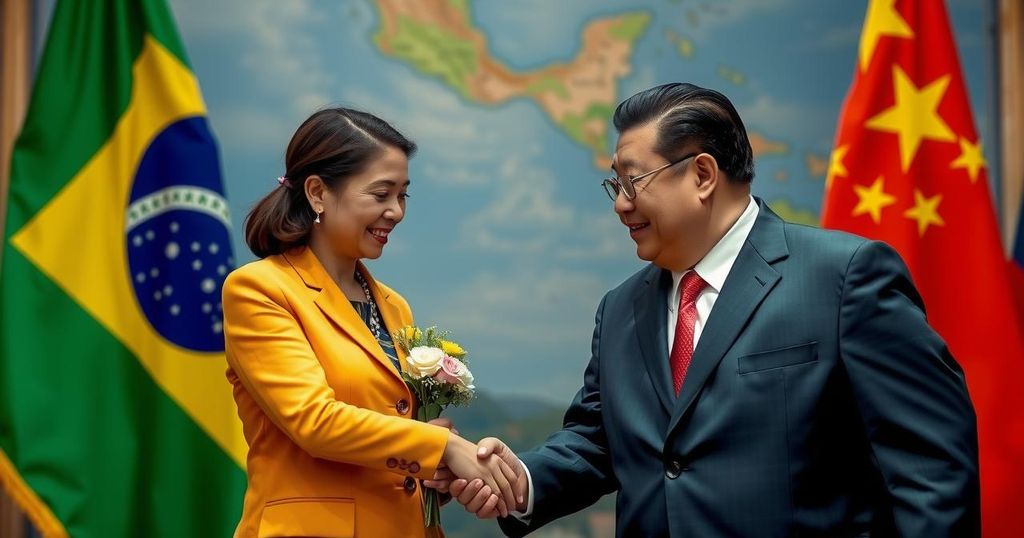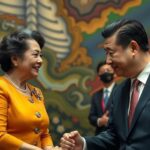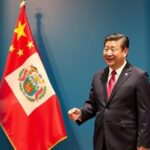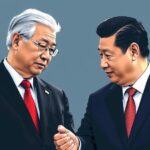Politics
AFRICA, ASIA, ASIA - PACIFIC ECONOMIC COOPERATION, BEIJING, BELT AND ROAD INITIATIVE, BRASILIA, BRAZIL, BRITAIN, CHINA, ECONOMIC COOPERATION, ECONOMIE, EUROPE, FRANCE, GEOPOLITICS, GERMANY, GROUP OF 20, INDIA, INTERNATIONAL RELATIONS, LIMA, LU, LUIZ INACIO LULA DA SILVA, LULA, MEXICO, NORTH AMERICA, PERU, RIO DE JANEIRO, SERBIA, SOUTH AFRICA, SOUTH AMERICA, STRATEGIC PARTNERSHIP, TRADE RELATIONS, U. S, UNITED STATES, VIETNAM, WHITE HOUSE, XI JINPING
Clara Montgomery
Xi Jinping and Lula da Silva Elevate China-Brazil Relations during Historic Visit
Chinese President Xi Jinping and Brazilian President Luiz Inacio Lula da Silva elevated their nations’ relationship during a recent state visit, announcing a partnership that emphasizes a collective vision for global sustainability. They explored synergies between the Belt and Road Initiative and Brazil’s development while signing nearly 40 cooperation agreements. This marks a significant step in China-Brazil ties amid shifting international diplomatic dynamics, particularly as Xi positions his nation as a key player in a changing geopolitical landscape.
In a state visit on Wednesday, Chinese President Xi Jinping and Brazilian President Luiz Inacio Lula da Silva elevated the status of their bilateral relations, signifying a deeper partnership as part of a global strategic initiative. The leaders announced an intention to foster a ‘Community with a Shared Future for a More Just World and Sustainable Planet,’ thereby expanding a key principle espoused by Xi. They also committed to exploring synergies between China’s Belt and Road Initiative and Brazil’s development efforts, despite Lula’s previous hesitance to formally join the infrastructure initiative. This visit culminated in the signing of nearly 40 cooperation agreements, which aim to enhance the trade relationship between China and Brazil, worth over $150 billion.
President Xi characterized this moment as historic, expressing China’s readiness to further solidify ties, referring to both nations as ‘golden partners.’ This sentiment reflects China’s strategic focus on building comprehensive partnerships with countries that share similar geopolitical and economic objectives. The term ‘Community with a Shared Future’ has also been employed by Xi in his diplomacy with nations such as Vietnam and Serbia in recent months.
This visit followed Xi’s participation in significant summits, including the Asia-Pacific Economic Cooperation forum in Lima and the G20 in Rio de Janeiro. Despite U.S. President Joe Biden’s participation being perceived as diminished, Xi’s engagements positioned him as a central figure amid a changing global diplomatic landscape.
As China engages with Western countries amid existing tensions, experts highlight a shift in Beijing’s approach, where it appears to be adopting a more conciliatory stance, particularly in anticipation of the challenging geopolitical dynamics in the coming years under a potential Trump administration. During this transitional phase of international diplomacy, several diplomats observed a marked increase in China’s proactive stance towards fostering consensus, further emphasizing its commitment to engaging in multilateral discussions previously neglected under a unilateral approach.
Overall, this development illustrates China’s ambition to assert itself as a dominant diplomatic force in a shifting global order, effectively filling spaces that may be vacated by U.S. leadership.
This article discusses the recent state visit of Chinese President Xi Jinping to Brazil, where he and President Luiz Inacio Lula da Silva signed numerous agreements to reinforce their nations’ strategic partnership. The article reflects on the growing diplomatic relationship between China and Brazil amidst changing global dynamics, particularly in light of the upcoming transition in U.S. foreign policy. The backdrop consists of Xi’s participation in significant multilateral summits and a perceived shift in China’s diplomatic approach, seeking to assert its influence in the absence of a cohesive U.S. strategy under President Biden and a forthcoming Trump administration. The significance of the partnership is underscored by the concept of a ‘Community with a Shared Future,’ illustrating the leaders’ shared vision for a more collaborative global environment. This alignment is not only integral to the China-Brazil relationship but also indicative of China’s broader diplomatic goals in the context of international forums being increasingly pivotal in addressing global challenges. Moreover, the potential implications of Lula’s reluctance to fully embrace the Belt and Road Initiative while exploring collaboration underscore a nuanced approach from Brazil, seeking to balance economic partnerships with sovereign development priorities.
In conclusion, the recent state visit of President Xi Jinping to Brazil represents a significant milestone in the enhancement of China-Brazil relations by establishing a deeper strategic partnership. With the signing of numerous cooperation agreements and a shared vision for a more just and sustainable world, both leaders have portrayed their intent to elevate bilateral ties. As Xi’s approach to diplomacy reflects an evolving strategy aimed at filling gaps left by U.S. foreign policy dynamics, it further signifies China’s aspirations to emerge as a leading diplomatic authority on the global stage. This partnership is poised to cultivate enhanced collaboration, potentially influencing the broader geopolitical landscape in the coming years.
Original Source: www.voanews.com








Post Comment